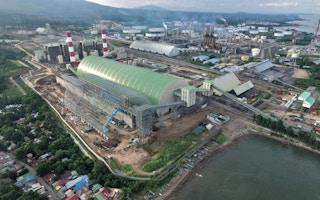San Miguel Corp (SMC), the Philippines’ largest conglomerate, will no longer continue the construction of new coal-fired power plants with a combined capacity of 1,500 megawatts (MW) through its subsidiary SMC Global Power Holdings Corp, its president and chief operating officer Ramon Ang announced over the weekend.
To continue reading, subscribe to Eco‑Business.
There's something for everyone. We offer a range of subscription plans.
- Access our stories and receive our Insights Weekly newsletter with the free EB Member plan.
- Unlock unlimited access to our content and archive with EB Circle.
- Publish your content with EB Premium.
“Recently, we took the big step of dropping new coal projects from our expansion plans. Instead, we are ramping up our renewable power capacities,” Ang said in a Facebook post.
“This has not been easy as our country still depends much on reliable and affordable traditional power sources. Nevertheless, we have reached a stage where, through strategic collaborations and the use of new technologies, we are confident we can transition to a low-carbon future, without compromising our economy’s growing power needs.”
A week earlier, the Power for People Coalition (P4P), a network of civil society organisations, communities and cooperatives that rally against pollutive fuels, shared with the media a letter signed by the department of energy (DOE) confirming the discontinuation of SMC’s proposed power projects in Pagbilao and Sariaya in Quezon, with a capacity of 600MW each, and a 300MW plant in Malabuyoc, Cebu.
SMC said in a press statement on Monday that its coal projects were cancelled in favour of cleaner energy sources, including 31 new battery energy storage systems (BESS) with a rated capacity of 1,000 MW, scheduled for completion by this year and next.
The energy giant is likewise looking to build new solar plants in combination with the BESS facilities in ten areas across the country. The plants will be commercially operational by 2023, SMC has said.
Gerry Arances, convenor of P4P, lauded the cancellation of the three projects but noted that SMC has five coal-fired power plant projects in the pipeline which “can still pollute their host communities and contribute to overpriced electricity for consumers.”
Based on monitoring of DOE and SMC disclosures in recent years, P4P said that these proposed projects include a 300MW coal plant in San Carlos, Negros Occidental; a 300MW coal expansion project in Malita, Davao; Central Luzon Premiere Power Corporation’s 4x355MW project; and Lumiere Energy Technologies Inc’s 2x355 project, both in Pagbilao; and a 328MW coal plant in Davao del Sur.
P4P said it is still trying to confirm with DOE on the status of these projects, some of which have been delisted due to non-submission of required updates or because of ongoing reviews.
Since the DOE announced its coal moratorium in October last year, about 3,100MW or five projects have been shelved, with nearly 12,000MW of proposed coal capacity still undetermined.
SMC Global Power Holding accounts for about 40 per cent of all current coal proposals—the second largest in the country—at a combined capacity of 4,933MW worth of coal projects, according to a Greenpeace report in 2019.
The Manila Electric Co, the country’s biggest power distribution utility through its subsidiary, Meralco Powergen Corporation (MGen), has the most coal projects under construction at 5,470MW.
Coal-affected areas: Triumphant but wary
Communities in Sariaya, Pagbilao, and Malabuyoc called the discontinuation of the proposed coal projects in their areas a “triumph of the resistance against coal and a signal to the nearing end of the shrinking coal pipeline.”
“We hope this will lead to the cancellation of other ongoing dirty energy projects in the province of Quezon, especially in Atimonan. It is our moral obligation to effect a swift transition to renewable energy sources and work for the protection of our common home,” said Father Noel Villareal, one of the community and Church leaders behind the coal fight in Quezon.
However, DOE said in the same letter to P4P that the Meralco-backed Atimonan One Energy coal project in Quezon is still working towards implementation and is currently seeking extension of its loan facility with lenders after extreme delays due to difficulties in securing a power supply agreement.
The Atimonan project has also violated environmental protection laws for permitting the cutting of thousands of trees in the project site between 2016 and 2017.
Addressing a previously identified key funder of Atimonan project, director of the diocese of Lucena’s ministry on ecology Father Warren Puno said: “We from the ground have been waiting to hear news like this for so long, and we call on Bank of the Philippine Islands to stand by its proclamation that it intends to eventually phase out its coal loans by withdrawing from coal, especially from the Atimonan project. We will stay vigilant until there is clarity that all coal projects still in the pipeline today will no longer be allowed to continue.”










